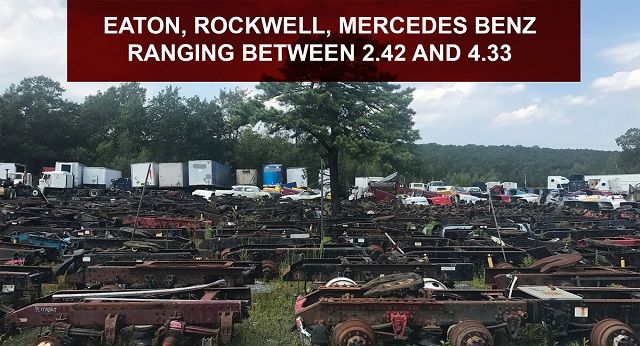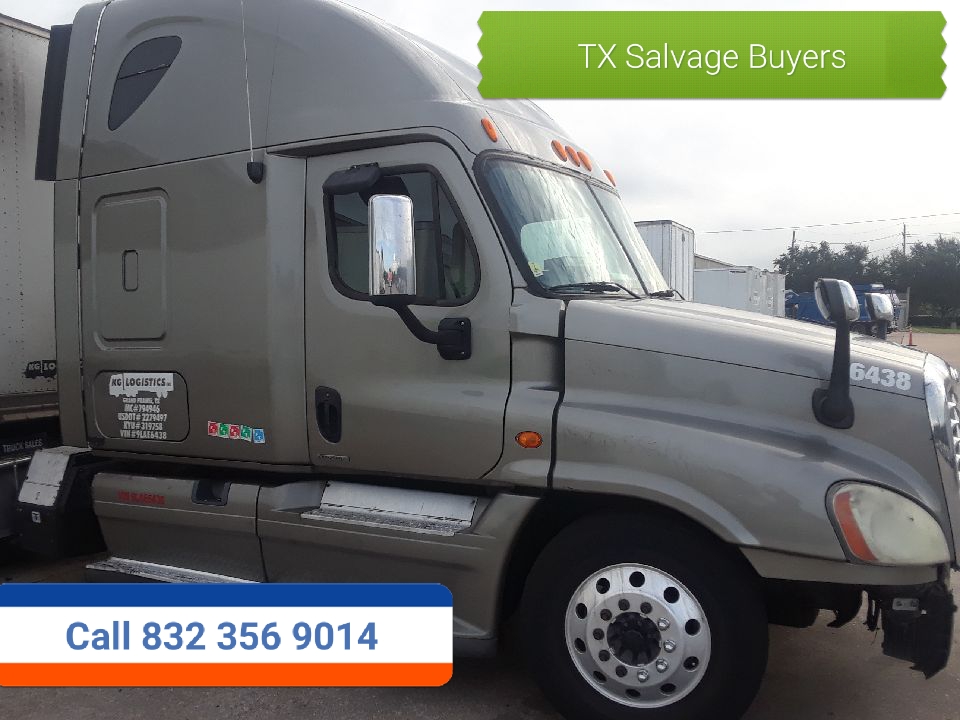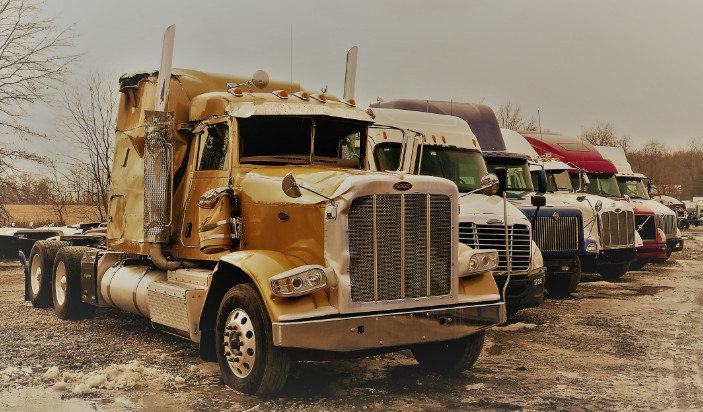Salvage Semi Trucks For Sale Near Me: Unlocking Value in Damaged Giants pickup.truckstrend.com
The rumble of a semi-truck is the sound of commerce, moving goods across continents and powering economies. But what happens when these titans of the road face an unfortunate incident, leading to a "salvage" title? For the shrewd buyer, a salvage semi truck isn’t just a write-off; it’s a potential goldmine, offering a path to significant savings or even a profitable venture. The phrase "Salvage Semi Trucks For Sale Near Me" isn’t just a search query; it’s a gateway to a unique market where mechanical expertise meets financial opportunity. This comprehensive guide will delve into every facet of this specialized market, from understanding what a salvage title truly means to navigating the buying process and realizing the full potential of these damaged giants.
What Exactly Are Salvage Semi Trucks?
Salvage Semi Trucks For Sale Near Me: Unlocking Value in Damaged Giants
At its core, a salvage semi truck is a vehicle that an insurance company has deemed a "total loss" due to damage, theft, or other factors. This doesn’t necessarily mean the truck is beyond repair; rather, it implies that the estimated cost of repairs exceeds a certain percentage of its pre-damage market value (often 70-80%, though this varies by state and insurer). When a vehicle receives a salvage title, it signifies that it cannot be legally driven on public roads until it undergoes necessary repairs and passes a state-mandated inspection to be re-titled as "rebuilt" or "reconstructed."
Common reasons for a semi truck to receive a salvage title include:
- Accident Damage: Collision, rollover, or jackknifing incidents can cause extensive body, frame, or mechanical damage.
- Flood Damage: Water ingress can wreak havoc on electrical systems, interiors, and even engine components, leading to a total loss even if superficial damage is minimal.
- Fire Damage: Engine fires, cabin fires, or even trailer fires can render a truck a salvage title, often with significant structural or system damage.
- Theft Recovery: If a truck is stolen and then recovered, especially after a long period, it may be declared a total loss due to potential damage, missing parts, or simply the logistics of recovery and storage.
- Mechanical Failure: While less common for a full salvage title, catastrophic engine or transmission failure in an older, lower-value truck could lead to it being written off if repair costs outweigh its value.
- Vandalism: Extensive and costly vandalism can also lead to a salvage designation.

It’s crucial to understand that a salvage title is distinct from a "rebuilt" or "reconstructed" title. A salvage title means it has been declared a total loss. A rebuilt title means it was a salvage vehicle, has been repaired, inspected, and is now deemed roadworthy again.
Why Consider Buying a Salvage Semi Truck?
The primary allure of purchasing a salvage semi truck is undeniably the significant cost savings. These vehicles are typically sold at a fraction of the price of a comparable clean-title truck, often at 30-60% less, sometimes even more, depending on the extent of the damage. This opens up several compelling opportunities:

- High Return on Investment (ROI): For those with the mechanical expertise, or access to affordable repair services, restoring a salvage truck can result in a roadworthy vehicle valued significantly higher than the total investment.
- Parts Harvesting: Even if a truck is beyond economical repair, its undamaged components (engine, transmission, axles, cabin parts, tires) can be extremely valuable. Buying a salvage truck solely for parts can be far more cost-effective than purchasing individual new or used components.
- Project Vehicle/Customization: Mechanics, trucking enthusiasts, or small fleet owners looking for a challenging project can acquire a specific make or model they desire at a lower entry cost, allowing them to rebuild it to their exact specifications.
- Scrap Value: As a last resort, if the truck proves too costly to repair, the metal and some components still hold scrap value, offering some recoupment of the initial investment.

For entrepreneurs, a successfully rebuilt salvage truck can be a cost-effective way to expand a fleet, replace an aging unit, or even enter the trucking business without the massive capital outlay typically required for new or clean-title used trucks.
Navigating the "Near Me" Aspect: Finding Local Deals
The "Near Me" in "Salvage Semi Trucks For Sale Near Me" is critical. Proximity simplifies inspection, reduces transportation costs, and allows for easier logistics if you plan to repair the truck yourself. Here’s where to look:
- Online Auction Platforms: These are the largest sources. Sites like Copart and IAAI (Insurance Auto Auctions) specialize in salvage vehicles, including semi trucks. While they operate nationally, you can filter searches by location to find trucks in your area.
- Local Salvage Yards & Truck Dismantlers: Many independent salvage yards or truck-specific dismantlers purchase salvage trucks directly from insurance companies or individuals. A quick online search for "truck salvage yard [your city/state]" or "used truck parts [your city/state]" can reveal local options.
- Online Classifieds: Websites like Craigslist or Facebook Marketplace often have listings from individuals or small businesses selling salvage trucks. These can sometimes be direct sales, cutting out auction fees.
- Specialized Truck Dealers: Some used truck dealerships might also deal in "as-is" or light-salvage vehicles, though this is less common for heavily damaged trucks.
- Networking: Talk to local mechanics, body shops, tow truck operators, and other truckers. They often know about available salvage trucks before they hit the broader market.
When using online platforms, pay close attention to the truck’s physical location. Even if an auction is online, the truck might be hundreds of miles away, adding significant transportation costs.
The Buying Process: A Step-by-Step Guide
Purchasing a salvage semi truck requires meticulous attention to detail.
- Research and Budgeting: Determine your maximum budget, including purchase price, potential repair costs, transportation, and re-titling fees. Research the market value of the specific make/model/year in good condition to gauge potential ROI.
- Locate Potential Trucks: Utilize the resources mentioned above, filtering by location, make, model, and damage type.
- Thorough Inspection (CRITICAL!): This is the most vital step.
- On-site Inspection: If possible, physically inspect the truck. Look beyond superficial damage. Check the frame for bends or cracks, inspect the engine compartment for fluid leaks or obvious structural issues, examine the cabin for water damage (mold, rust), and check tire condition.
- Professional Pre-Purchase Inspection (PPI): For serious contenders, hire a qualified heavy-duty mechanic specializing in semi trucks to perform a comprehensive inspection. They can identify hidden damage that an untrained eye would miss.
- Review Documentation: Obtain all available information: photos, damage reports, previous maintenance records, and especially the VIN.
- Understand the Salvage Title & State Laws: Each state has specific requirements for re-titling a salvage vehicle as "rebuilt." Understand the process, required inspections, and documentation for your state before you buy.
- Bidding/Negotiating: If buying from an auction, set your maximum bid and stick to it. If buying privately, negotiate based on your assessment of damage and repair costs.
- Financing and Payment: Most lenders are hesitant to finance salvage vehicles. Be prepared to pay cash or secure a personal loan.
- Transportation: Arrange for transport. A salvage truck typically cannot be driven legally until it’s rebuilt and re-titled. Factor in towing or flatbed transport costs.
- Repair and Re-titling: This is the most labor-intensive part.
- Repair Plan: Outline all necessary repairs, sourcing parts (new, used, aftermarket).
- Execution: Perform or oversee repairs. Document everything with photos and receipts.
- State Inspection: Once repaired, schedule the required state inspection. This often involves verifying that the repairs were done correctly and safely, and that the vehicle meets all safety standards.
- Re-titling: With a successful inspection, you can apply for a "rebuilt" or "reconstructed" title, allowing you to register and insure the truck for road use.
Crucial Considerations Before You Buy
While attractive, buying a salvage semi truck is not without its risks:
- Damage Assessment Complexity: Hidden damage is a major concern. Frame damage, unseen electrical issues, or internal engine/transmission damage can turn a good deal into a money pit.
- Unforeseen Repair Costs: Estimates can quickly balloon. Parts for semi trucks are expensive, and specialized labor can add up. Always budget for more than your initial repair estimate.
- Legal & Titling Hurdles: State laws vary significantly. Some states have stricter inspection processes or specific requirements for what constitutes a "rebuilt" vehicle. Failure to meet these can leave you with an unusable truck.
- Insurance Challenges: Insuring a rebuilt salvage truck can be more difficult and expensive. Some insurers may refuse full coverage, or premiums might be higher due to the vehicle’s history.
- Lower Resale Value: Even with a rebuilt title, the truck’s value will generally be lower than a comparable clean-title vehicle due to its history. This impacts future selling opportunities.
- Safety Concerns: If repairs aren’t done professionally and thoroughly, there could be long-term safety implications. Structural integrity must be fully restored.
Types of Salvage Semi Trucks You Might Find
Salvage trucks come in various forms, dictated by their original configuration and the nature of the damage:
- By Damage Type:
- Collision: Front-end, rear-end, side impacts. Can range from cosmetic to major frame damage.
- Flood: Water lines visible, rust, electrical issues, mold. Highly risky.
- Fire: Burn marks, melted components, structural integrity concerns.
- Mechanical: Catastrophic engine/transmission failure, often in older trucks where repair isn’t economically viable.
- Theft Recovery: Missing parts, ignition damage, or simply written off due to recovery costs.
- By Manufacturer: You’ll find salvage trucks from all major manufacturers: Freightliner, Peterbilt, Kenworth, Volvo, Mack, International, Western Star, etc. Parts availability can vary by brand.
- By Configuration:
- Day Cabs: Smaller, often used for local hauling.
- Sleeper Cabs: Larger, designed for long-haul operations.
- Vocational Trucks: Dump trucks, refuse trucks, cement mixers – often very specialized and expensive to repair.
Tips for a Successful Purchase
- Always Bring a Mechanic: This cannot be stressed enough. An expert eye is your best defense against hidden problems.
- Run a VIN Check: Use services like NMVTIS (National Motor Vehicle Title Information System) or CarFax (though less common for heavy trucks) to get a full history, including past accidents, title brands, and odometer readings.
- Factor in ALL Costs: Create a detailed spreadsheet: purchase price + auction fees + buyer’s premium + transport + parts + labor + re-titling fees + unexpected costs (add 15-20% buffer).
- Don’t Rush: There will always be another salvage truck. Take your time, do your due diligence, and don’t get emotionally attached to a specific unit.
- Be Realistic: Understand that a salvage truck is a project. It will require time, effort, and potentially more money than initially anticipated.
Potential Challenges and Solutions
- Challenge: Hidden Damage:
- Solution: Professional pre-purchase inspection. Focus on frame, suspension, drivetrain, and electrical systems. Assume the worst, hope for the best.
- Challenge: High Repair Costs:
- Solution: Source used or aftermarket parts where appropriate. Do some DIY labor if you have the skills. Get multiple quotes for specialized repairs. Consider if parts harvesting is a better option.
- Challenge: Titling Issues:
- Solution: Research your state’s DMV/DOT requirements before buying. Keep meticulous records of all repairs, parts purchased, and labor performed.
- Challenge: Financing Difficulties:
- Solution: Be prepared for a cash purchase. Explore personal loans or lines of credit if necessary, but understand interest rates may be higher.
- Challenge: Insurance Woes:
- Solution: Shop around with multiple insurance providers. Be transparent about the truck’s salvage history. You may need to start with liability-only coverage until the truck proves its reliability.
Salvage Semi Truck Estimated Price Guide
Please note: These prices are highly variable and depend on the truck’s make, model, year, mileage, pre-damage value, extent of damage, and specific location. This table provides ranges for illustrative purposes only.
| Truck Type / Condition | Estimated Salvage Price Range (USD) | Estimated Repair Cost Range (USD) | Potential Rebuilt Value (USD) | Notes |
|---|---|---|---|---|
| Light Collision/Cosmetic Damage | $5,000 – $15,000 | $3,000 – $10,000 | 70-85% of Clean Title Value | Minor body panels, bumper, lights. Engine/frame often intact. Easiest to repair. |
| Moderate Collision/Mechanical Issues | $8,000 – $25,000 | $10,000 – $30,000+ | 60-75% of Clean Title Value | May involve cab damage, minor frame tweaking, or significant engine/transmission work (e.g., bad turbo, injector issues). |
| Heavy Collision/Rollover/Extensive Fire | $2,000 – $12,000 | $20,000 – $50,000+ | 40-60% of Clean Title Value | Significant structural damage, bent frame, destroyed cab, extensive engine/electrical damage. Often bought for parts or by expert rebuilders. |
| Flood Damage (Freshwater) | $1,000 – $8,000 | $15,000 – $40,000+ | 30-50% of Clean Title Value | High risk of long-term electrical and rust issues. Extensive tear-down and replacement required. |
| Flood Damage (Saltwater) | $500 – $3,000 | $30,000 – $60,000+ | 10-30% of Clean Title Value | Extremely high risk. Often bought solely for scrap or a few specific components. Not recommended for rebuilding due to severe corrosion. |
| Major Engine/Transmission Failure (Older Truck) | $3,000 – $10,000 | $10,000 – $25,000 | 50-70% of Clean Title Value | If the chassis and cab are in good condition, an engine/transmission swap can be viable, but parts are costly. |
| Theft Recovery (Minor Damage/Missing Parts) | $4,000 – $15,000 | $2,000 – $10,000 | 65-80% of Clean Title Value | Damage often limited to ignition, wiring, or missing interior/exterior components. Can be a good deal if parts are easily sourced. |
Disclaimer: These figures are estimates. Actual costs and values can vary wildly based on truck model, year, mileage, specific damage, labor rates, parts availability, and market demand.
Frequently Asked Questions (FAQ)
Q1: Can I drive a salvage semi truck off the lot?
A1: No. A vehicle with a salvage title cannot be legally driven on public roads until it has been repaired, inspected by the state, and issued a "rebuilt" or "reconstructed" title. You will need to arrange for towing or flatbed transport.
Q2: How do I know if the damage is too severe?
A2: A professional pre-purchase inspection by a qualified heavy-duty mechanic is essential. They can identify frame damage, major electrical issues, or internal engine/transmission problems that make repairs uneconomical. Be wary of flood or fire damage, as these often have hidden, long-term issues.
Q3: Is it hard to get insurance for a rebuilt semi truck?
A3: It can be more challenging. Some insurers may be reluctant to offer full coverage (comprehensive and collision) on a rebuilt title vehicle, or premiums might be significantly higher. Shop around and be prepared to explain the repair process and the truck’s current condition.
Q4: Will a rebuilt title affect the truck’s resale value?
A4: Yes, a rebuilt title will almost always result in a lower resale value compared to a comparable clean-title truck. Buyers are often wary of a vehicle’s salvage history, even if fully repaired. Expect to sell it for 15-40% less than a clean-title equivalent.
Q5: What documentation do I need to keep for the re-titling process?
A5: Keep detailed records of all repairs, including receipts for all parts purchased (new or used) and invoices for any professional labor performed. Take "before," "during," and "after" photos of the repair process. The state inspection often requires proof that original damaged parts were replaced and that the truck meets safety standards.
Q6: Can I buy a salvage semi truck if I’m not a mechanic?
A6: You can, but it’s much riskier. You’ll be entirely reliant on external repair services, which can quickly become expensive. It’s advisable only if you have a trusted heavy-duty mechanic who can manage the entire repair process for you and provide accurate cost estimates.
Conclusion
The market for "Salvage Semi Trucks For Sale Near Me" presents a fascinating dichotomy: a landscape of risk and reward. For the informed, meticulous, and mechanically inclined buyer, it offers an unparalleled opportunity to acquire a valuable asset at a significantly reduced cost. Whether you’re a seasoned mechanic looking for a profitable project, a fleet owner seeking to expand on a budget, or an entrepreneur eager to enter the trucking industry, salvage trucks can be a gateway.
However, success in this arena hinges entirely on due diligence. Thorough inspection, a deep understanding of potential repair costs, knowledge of state titling laws, and a realistic assessment of your own capabilities are paramount. Without these, a seemingly great deal can quickly transform into a frustrating and expensive money pit. Approach this market with caution, a healthy dose of skepticism, and an unwavering commitment to research, and you might just unlock substantial value from these resilient giants of the road.


